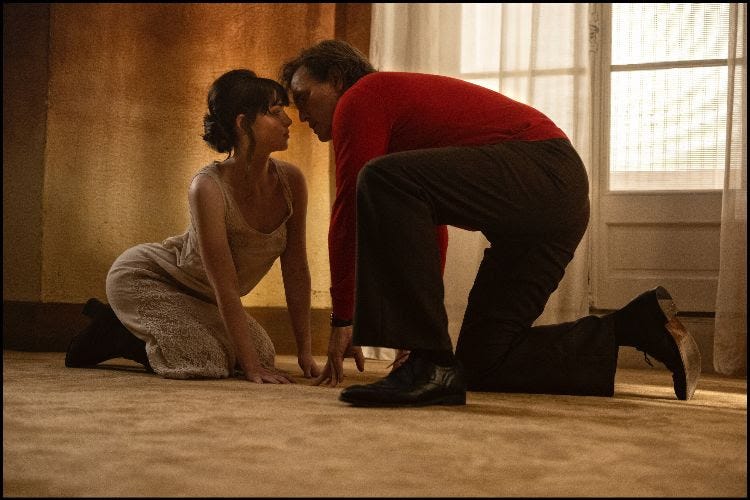Being Maria opens March 21 in NYC at the Quad and March 28 in LA at the Nuart
Describe the Film for Us
Being Maria is an intimate film that delves into the gaze surrounding Maria Schneider, whose life was shaped by fame and the weight of others judgment. The film explores her inner world and questions the ways in which we construct, confine, and sometimes wrongly judge individuals. It is the portrait of a broken woman who nonetheless confronts adversity and rises again.
It is also a deep dive into the slow poison of trauma—the trauma Maria endured during the filming of Last Tango in Paris, which left a lasting imprint on the rest of her life. Her meteoric rise clashed with a media landscape that was often reductive and violent, shaping an image that no longer belonged to her.
Being Maria is also a film about perception—about what it means to be seen and misperceived, about the quest for love and recognition in the eyes of others. A gaze that can elevate, break, and sometimes imprison.
What Drew You to This Story?
Maria’s story attracted me because of its emotional intensity, its timelessness, and its universal themes. It explores dynamics of control and resistance, which deeply interest me in cinema.
What Do You Want People to Think About or Question After Watching This Film?
I wanted to tell an honest story. I do not judge; I present a reality. I would like viewers to reflect on how we look at women, particularly young women who face constant societal pressures and expectations.
What Was the Biggest Challenge in Making This Film?
Once I decided that the film would be entirely told through Maria Schneider’s perspective, I built my direction around that concept. The challenge was to remain walking the fine line of Maria’s gaze, never straying from her point of view.
What Was the Development Process Like? How Did You Get the Green Light?
Vanessa Schneider, Maria Schneider’s cousin and the author of the book, placed her trust in me, which was essential. I met with witnesses and friends from Maria Schneider’s life. I wrote the screenplay with Laurette Polmanss. The first major challenge was casting—who would play Maria Schneider? Who would be Marlon Brando?
For Maria’s part, I held a long casting process over several months. I saw many actresses, but Anamaria Vartolomei stood out—not because of her resemblance (I didn’t want to make a conventional biopic) but because of her determination and energy. She’s a fighter.
For Marlon Brando, it was a real challenge. I wanted an actor who embodied Hollywood while also bringing his own interpretation of Brando. My first choice was Matt Dillon—he became a Hollywood icon at a young age, and I was certain he could credibly portray Brando.
However, financing the film was not easy. My producer and I heard comments like, “Why make a film about this poor girl? … Why bring up this story again?” It was shocking to hear, and it only fueled my determination to make the film.
What Inspired You to Become a Storyteller?
I believe it was films themselves that inspired me. I have always been fascinated by how a story can deeply move someone and leave a lasting impact. Cinema is a universal language that allows us to explore intimate themes. I love telling human stories, exploring fractures, breaking points, and those moments when everything shifts.
What’s the Best and Worst Advice You’ve Ever Received?
Best advice: “Stay true to your vision.” In this industry, it’s easy to be tempted to make compromises to please or reassure others. But a film needs a strong, clear voice.
Worst advice: “Make something more commercial.” I believe sincerity always wins out in the long run.
What Advice Would You Give to Other Female Creators?
Dare, persist, and surround yourself with the right people. You have to believe in your stories and not wait for permission to tell them. Cinema still has a long way to go in terms of female representation, but things are evolving. We need to claim our space without waiting for it to be given to us.
Name Your Favorite Film Directed by a Woman and Explain Why.
There are so many… The one that has stayed with me for a long time is The Piano by Jane Campion. But to mention a very recent film, I would say Vingt Dieux (Holy Cow) by Louise Courvoisier. It is a film of great freedom, deeply poetic while being grounded in strong social reality.
Is There Anything Else You’d Like People to Know About This Film?
Maria is not just the portrait of an actress—it is also a film about deep, invisible wounds, the kind that take time to heal. I hope everyone finds something that resonates with them, an emotion that speaks to them. And that Maria Schneider will finally be heard and recognized.
Synopis
Maria Schneider (Anamaria Vartolomei, Happening) is a promising young French actress. When she gets the lead in a feature film directed by an acclaimed Italian filmmaker and starring one of America’s most beloved actors, it seems like the opportunity of a lifetime. Her collaborators, director Bernardo Bertolucci and star Marlon Brando (Matt Dillon) seem to be bringing out the best in Maria, sharing a warm rapport and mentorship with the 19-year old girl. Until one day, when the men conspire to shoot a crucial sex scene as a harrowing assault without letting Maria in on the plan. The film goes on to be lauded as a fearless artistic breakthrough, but for Maria, it’s the beginning of a living hell. Based on the behind-the-scenes true story of the making of Last Tango in Paris, Jessica Palud’s sensitive biopic centers Maria’s story for the first time.




That looks great. Can't wait to see it.